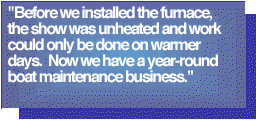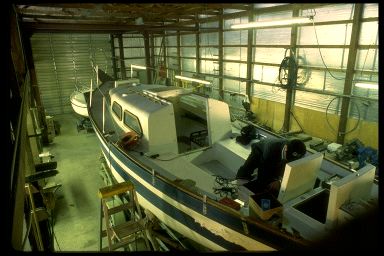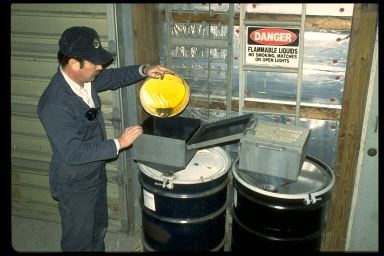
22. West Access Marina
Used Oil Recycled to Heat Boat Repair Building
| Location: | 14222 Lake Road, P.O. Box 186, Carlyle, Illinois |
| Telephone: | (618) 594-2461; fax: (618) 594-2226 |
| Interviewed: | Richard W. Golding, CMM, General Manager, Partner |
| Owned by: | Carlyle Limited Partnership, dba West Access Marina |
| Waterbody: | Carlyle Lake, Kaskaskia River |
Environmental change
A high-temperature oil burner consumes oil collected from servicing boats and marina vehicles and heats a work building, thus avoiding high costs for both oil disposal and energy.
The full-service inland lake marina
West Access Marina is a U.S. Army Corps of Engineers concession home port marina with 330 slips and 170 dry land spaces for boats on trailer storage. During the 1995 boating season, with annual slip rentals from April 1 through March 31, the slips were 98% sold out and the land storage 50% used. Boats range from 17 to 50 feet LOA (average 26.7 feet). Unlike most marinas, 92% of the boats are sailboats. In addition to seasonal slips, the marina also provides transient space for visiting boaters. The marina has a yacht club, boat rentals, used boat brokerage, trailer sales, retail store, fuel dock, and pumpout. A public beach and boat ramp are within 300 feet of the marina. On a busy summer weekend, typically 50% of the boats are used, with about 30% used for overnight stays. There are no liveaboards at West Access.
Marina services include launch and haulout using the marina's hydraulic trailer and marina railway. Sailboats can be hauled, stored, and launched with the mast up. Repairs are done to hulls, fiberglass, engines, sail/rigging, painting, electronics, and welding. Land storage is also available for customer's cradles, trailers, and jack stands. There are no other marina facilities within a 2-mile radius, but there are almost 750 boats in use in the area that potentially need service at West Access Marina.
Called "Illinois's other Great Lake," Carlyle Lake, an inland lake, is located in southern Illinois about 45 miles due east of St. Louis, Missouri, and about 260 miles southwest of Chicago. It was created by the Corps of Engineers in 1967 for flood control, recreation, and navigation on the lower Kaskaskia River. West Access Marina was built in 1971 and was bought by the present owners in 1990.
Because Carlyle Lake is the principal drinking water resource for the City of Carlyle and other communities downstream, maintaining high water quality in the lake is essential for the marina and all other users.
Management measures
West Access Marina provides for the collection and reuse of liquid materials, and complies with the marina management measures for water quality assessment, habitat assessment, storm water runoff control, sewage facility, maintenance of sewage facilities, solid waste, petroleum control, boat cleaning, and public education.
Costs/benefits
West Access Marina invested $7,000 to buy and install a used oil furnace and spends $300 annually to heat its boat maintenance building in the winter. By doing so, West Access Marina created a new profit center that earned $9,495 from additional boat repairs, saved $1,095 in heating oil costs, and avoided $9,099 in waste oil removal/disposal costs in 1994-95.
Environmental improvements
Each year, West Access Marina's boat engine maintenance services collect between 1,000 and 2,000 gallons of waste oil. Getting rid of that waste material is a costly problem that faces most marina and boatyard operations. "We eliminated the disposal problem and cost by burning the oil in a new high-temperature furnace in our boat repair building," Richard Golding explained. "It was installed in October 1993 at the suggestion of my yard foreman. It hangs from the ceiling of our 60-foot by 60-foot shop and keeps the boats warm enough to work on them throughout the winter's cold. The used oil (now fuel) is stored in a 1,000-gallon drum, but is collected in smaller barrels in designated storage sites in the work yard. Before we installed the furnace, the shop was unheated and work could only be done on warmer days. Now we have a year-round boat maintenance business."
| Used engine oil is saved as a fuel by West Access Marina. (photo by West Access Marina) |
|
|
The Clean Burn multi-oil furnace burns at 3,000 degrees Fahrenheit, uses a compressor to vaporize the fuel, and shoots a flame almost 3 feet long. "Because of the high temperature, it burns very clean," observed Golding, "and nothing comes out the stack." According to the manufacturer, such furnaces are allowed to be used in all states except California. They can burn a mix of petroleum products with some solvents as long as none of the products have been labeled hazardous by a manufacturer.
The furnace and air compressor cost $4,100, plus $2,900 labor, for a total of $7,000. The burner cleaning contract costs $187, which together with $113 in filters, compressor electricity, and labor results in a total annual operating cost of $300.
"Every 55-gallon barrel of waste oil costs $283 to be removed and disposed of properly, plus $54 for a replacement barrel-$337 per barrel," Golding calculated, "or $6.13 per gallon."
"During the 1994-95 winter we collected and burned 1,500 gallons from our work, yielding $9,099 waste oil removal cost avoided. We recycled the oil into heat energy for a nice $1,095 fuel saving (average $0.73/gal). We do need to buy more heating fuel, however, because our shop burns more oil than we produce. We expect to save even more from collecting and burning an estimated 2,000 gallons of waste oil during the 1995-96 winter."
"The extra boat work we did on days previously too cold for work, I estimate, generated $9,495 new income. We really created a winter repair profit center we never had before. Between savings and new work, we came out ahead by $19,689," said a proud Golding.
"Since the winter of 1993, we have insulated the walls and put a ceiling in the now-heated building. When not repairing boats, we have rebuilt two tractors, rebuilt the lawn mower, and replaced two hydraulic cylinders on the trailer while rebuilding its axles. These were all done during the winter months in a building that was unused before because it had no heat source."
"Beside the savings, the waste oil is no longer a problem, and we don't find surprises in the dumpsters with obvious environmental benefits. People now come to the lake and say it looks cleaner-and it is. A clean marina helps boating customers, families, and friends enjoy boating here."
"There are eight other waste oil burners in other businesses around the area," Golding added. Many states allow burning waste oil collected as part of the normal business operations from work on boat engines and the yard's own cars and trucks. Interestingly, if oil collected during this work is placed in a barrel labeled "fuel oil" for heat, it is viewed very differently by regulatory agencies than oil labeled "waste oil." For every gallon of used oil burned as fuel, West Access Marina saves $6.86 ($6.13 removal/disposal and $0.73 new heating fuel purchase avoided).
Other improvements and benefits
West Access Marina practices positive public education. "We send an environmental fact pamphlet annually to all customers which talks about protecting the lake, antifreeze as a poison, pumpouts, recycling, waste disposal, and vacuum sanding." About oil, it says,
| Any oily sheen on the water is pollution. Soap or bilge cleaner changes the molecular structure, but does not mean it is no longer a pollutant-it just makes it heavier than water and it settles to the bottom. Let us show you what is available to protect our Lake and the environment. Please don't overfill your fuel tanks or pump oily water from your bilge into our Lake. The Bosun's Locker has oil absorbent pads that allow correct disposal. |
On each dumpster in the marina, all four sides have a sign:
| West Access Marina. Promotes and participates in the 'Clean Marina' program. Please let us assist you with the proper disposal of batteries, paints and solvents, oils, fuels and the filters for these items. Thank You. |
"We keep trying to improve our marina. Making a clean marina is a daily task," said Golding. "We have made many changes, such as installing a free self-serve pumpout and a portable toilet dump station, and upgraded our restrooms. To control runoff, we changed the contour of the marina with grassy berms, permeable parking lots, and a designated hull work area. Our fueling dock was improved with new spill prevention practices and added spill containment gear. Boats are urged to use oil-absorbing pads in their bilges. In addition to the oil, we recycle wood, metals, and foam flotation from old docks. Boat batteries are collected and immediately handed to a nearby auto parts store, which gives us a $5.00 credit per battery for recycling."
 As with many marinas
that allow do-it-yourself boat repairs, West Access Marina insists on the use of
dustless sanders as a major BMP against dirty runoff. The marina's brochure highlights
the need for using vacuum sanding. Two Fein dustless sanders are available for rent
by customers for $5.00 per hour, plus sanding disks. "We are considering buying
a third sander because they pay for themselves with rental, plus we make 40% profit
on the sanding disks and other supplies."
As with many marinas
that allow do-it-yourself boat repairs, West Access Marina insists on the use of
dustless sanders as a major BMP against dirty runoff. The marina's brochure highlights
the need for using vacuum sanding. Two Fein dustless sanders are available for rent
by customers for $5.00 per hour, plus sanding disks. "We are considering buying
a third sander because they pay for themselves with rental, plus we make 40% profit
on the sanding disks and other supplies."
All other waste liquids not burnable as fuel are put into marked barrels and picked up regularly by Safety Kleen, a nationwide commercial service. West Access Marina was the first marina in Illinois to get an NPDES storm water permit.
| Winter boat repairs are made possible by burning used oil in a special approved oil heater at West Access Marina (photo by West Access Marina). |  |
"I estimate that our clean marina image brings in an extra $50,000 gross in repair work each year, and helps explain why we are 98% occupied even though we have the highest slip rate on the lake. Our relations with the city are very good, but were not always good before we came. The Chamber of Commerce promotes our marina as valuable to the development of the area," Golding explained. "We are a nicer place to work, and have no trouble keeping employees and customers."
As a concessionaire on Corps of Engineers property, West Access Marina has a good image, especially for environmental practices. The Corps uses it for ERGO (Environmental Review Guide for Operators) training as a benchmark marina. The Carlyle Lake Management office manager, Robert Wilkins, wrote: "West Access Marina is one of the best run marinas I have been associated with in my 21 years with the U.S. Army Corps of Engineers. If all marina operators were as committed as Mr. Golding, there would be no need for laws or regulations covering marina operations. He takes care of the environment and his customers."
This demonstrates that clean water, clean marinas, and clean boating start with good owners and managers like Richard Golding. West Access Marina is definitely an asset to its area.
Equipment source
- Used multi-oil furnace: Clean Burn, Inc., 83 South Groffdale Road, Leola, PA 17540.
- Hazardous waste removal: Safety Kleen, Inc., 1000 North Randall Road, Elgin, IL 60123-7857.
http://www.epa.gov/owow/NPS/marinas/ch22.html
This page last updated October 4, 1999



